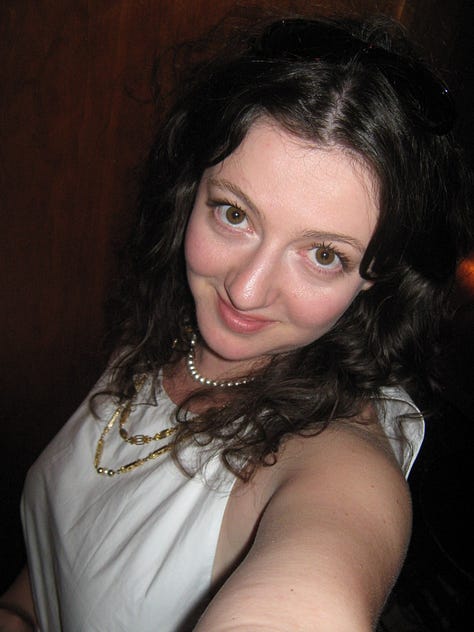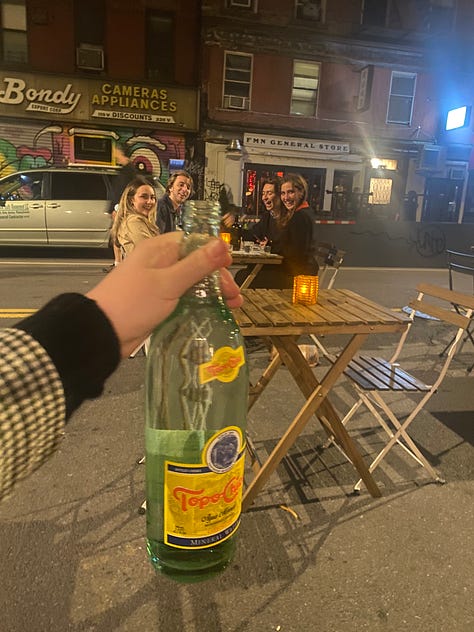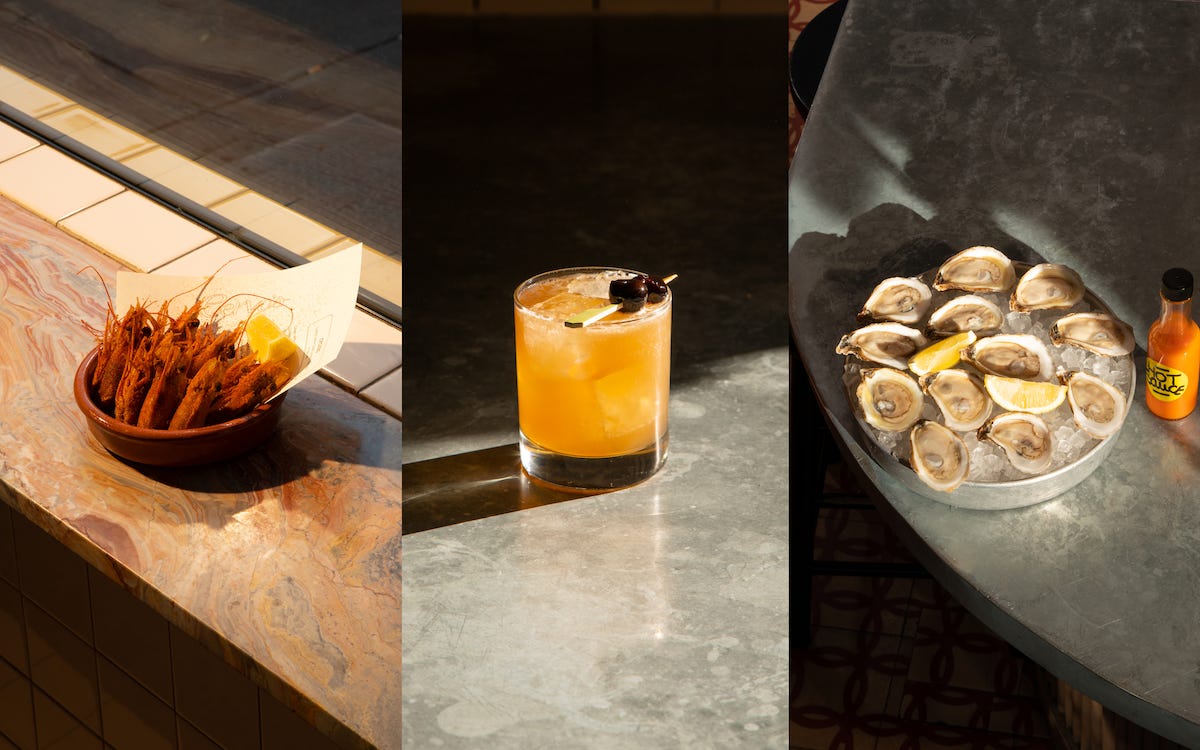Take Me to Your Spot: Gutes @ Cervo's
The Drunken Canal and byline co-founder dishes on media, Dimes Square, and her favorite restaurant
Welcome to Take Me to Your Spot, a new series with a simple premise: food, a fascinating person, and the restaurant connecting them. In each installment, an interesting New Yorker (as well as folks from further afield) takes us to their favorite restaurant—a place where they rank as a true regular—and shows us the ropes.
“Ok, so here’s the Cervo’s hack,” Gutes tells me, leaning forward across our two-top in this shoe-box of a restaurant. She points at the menu, a simple one sheet, and I squint in the dim, honey-hued glow provided by one of the lamp’s lining the wall — part of this place’s vibe-y charm (completed by the open kitchen, the address—Dimes Square, duh—and, of course, the crowd). “The hack is,” she continues, shifting slightly in her seat, moving a pair of chunky black sunglasses further up her head, adjusting what my unfashionable, still-stuck-in-the-early-aughts eyes mistake for a white, glittery pashmina, “no main courses.” A beat of silence, followed by a concession: “Ok, fine, the burger is great, and the chicken is probably, like, the best chicken in Lower Manhattan. But the starters are so good, and so much more fun, that not even the greatest main can compete with them.” Gutes raises a tumbler half full of the orange wine she was already drinking when I arrived, five minutes late to our dinner. “I say fuck the main, we’re going to fill up on starters. And we’re going to get drunk.”
Gutes—officially it’s Michelle Guterman, but that’s just according to her 26-year-old birth certificate that’s probably still at home in Palo Alto, California…and, like, also? In this city of self-invention, who cares?—should know what to order at Cervo’s: she’s been a regular here since the pandemic.
And yet, her history with the restaurant isn’t as seamless as that summary might suggest.
“I was actually really scared of this place until the pandemic,” she says. It’s a confession that catches me off guard given how confidently Gutes has just rattled off the greatest hits of her recent life, which includes discovering, while in Bar Harbor, Maine, that she’s really good at shucking oysters, a skill she attributes to her small hands (she proffers them, splaying her miniature fingers across the table, see?), which allow her, she claims, to be forceful but delicate. Those last three words, I note to myself, could possibly turn into her mantra or the title of her future memoir. Still, despite the sudden vulnerability, I’m skeptical, and so I press her for an explanation as to why Cervo’s, a place she appears to embrace with feline ease, and vice versa, could’ve been the cause for any personal anxiety. “I don’t know. Because it’s super small and cool, and I didn't think I was cool enough. But then when they opened outdoor seating, that's when I tried it and I felt less intimidated.” She braces herself with another sip of wine. “Also, I was just, like, not super confident in myself as a person, and probably smoking too much weed.”
“I don’t like reservations. I like to just eat what I want in the moment. I’ll walk in, and if I have to wait an hour, or grab a drink and a snack somewhere else in the meantime, no problem.”
The turn of confidence that saw Gutes become a Cervo’s regular came with the inception of The Drunken Canal, an art project turned newspaper—as in print; as in a big middle finger to the smartphones and social platforms that have otherwise defined her generation’s media consumption—that she launched “super deep pandemic” alongside her close friend Claire Banse, the proverbial yin to her yang. Their publishing schedule was erratic; the tone piss-taking; the writers, very online types like Dean Kissick and Honor Levy, equal parts edgy and erudite; the distribution strategy hacky—the girls wedged limited copies of the Canal into the existing newspaper boxes of bigger publications (repurpose, is how Gutes puts it). Soon, media gadflies gushed, especially the older, shut-in scribes suffering from FOMO envy, and profiles followed in Vogue, Vanity Fair, the Styles section…all the usual zeitgeist zoologists who help spread the lore. In short, Gutes and Banse displayed that potent mix of chutzpah and insouciant, who-gives-a-fuck charm this city has gone gaga for since time immemorial, or at least since the likes of Gatsby and Edie Sedgwick washed up here.



Cervo’s, it turns out, is part of the Canal’s story, too. There were drunken editorial meetings here with Banse. Gutes sending neighboring tables bottles of Topo Chico — the cheapest thing on the menu. Or the time a man paid Gutes $1,000 to take her here on a date, ordered clams, and found a pearl in his mouth. “Naturally, I fell in love with him on the spot.” Today, Gutes and Cervo’s are so intertwined that she just DMs the chef before arriving, or simply shows up.
“I don’t like reservations. I like to just eat what I want in the moment. I’ll walk in, and if I have to wait an hour, or grab a drink and a snack somewhere else in the meantime, no problem.”
As Gutes did last spring, on the eve of what she deems, “a big medical procedure.”
“So I was like, okay, in case everything goes wrong, I’m going to Cervo’s. And I came here and I sat at the bar by myself and just, like, ate dinner.” Gutes laughs, takes a sip of her drink — a Madeira Sour now, which we’ve moved onto at her insistence. “I thought: what is this, my last supper?”
Our food keeps arriving, plate after plate, all of it ordered by Gutes, who’s also extolled the virtues of each dish in rapid succession. Crispy shrimp heads. Spicy mussels escabeche, which we both deem good but too spicy. Cucumbers with soft shell crab and chili — excellent, btw. Half a dozen Paine’s Creek oysters.
“I like super briny food,” Gutes declares as she squeezes a lemon wedge across the shiny bivalves. “I’m Eastern European, so I think it stems from that.” And then, after something catches her eye at the side of our small hightop, adds: “Ohhh, the Cervo’s hot sauce.” She tips the red, yellow-labeled bottle over and drips a few dollops onto her first oyster, then encourages me to do the same. “Ok, I’m only going to do it to one. It’s vinegary. It’s delicious but also sacrilegious. The number of Cervo’s hot sauce bottles my friends and I have stole…” She snaps up, looks at me, flashes a wry smile. “Wait, I’m not being recorded, am I?”
Gutes seems purpose-built for someone to record her at all times, lest a precious sound bite be missed. I confess to my own habit of stealing pens from my favorite restaurants.
“I think stealing Cervo’s hot sauce is higher stakes than stealing pens,” Gutes says.
Flouting the rules is what got her here in the first place. They both broke the rules, Gutes and Banse, simply due to the fact that they didn’t know any better when they launched The Drunken Canal. At the time, Gutes was working at a gallery—“the Jane Lombard Gallery,” she says, “they were amazing and kept me on during the pandemic; put that in the story!”—while Banse was auditioning as an actress. Part of this rule-breaking earned them some stalkers, like the guy who wrote a short fictional story about getting in a bus accident with Gutes and having to save her life by stanching the bleeding coming from her “boobs and vagina” — she finally confronted him when he followed her to Equinox one day. And the rule-breaking also earned them some heat, with people openly mocking and chastising these seemingly wealthy and privileged kids online for their careless partying.
Gutes waves this off. “We were doing ketamine at an apartment in Chinatown, not going to underground parties with hundreds of people.”
Detractors and horse tranq house parties aside, they also won their fair share of fans thanks to their brash media tactics. Like running unsolicited advertisements in the Canal for writer Cat Marnell’s (author of the bestselling memoir: “How to Murder Your Life”) Patreon-funded beauty blog. This led to Marnell endorsing the duo on Twitter (Gutes, who was on mushrooms at the time, likens the tweet to “God knocking on the front door”), which, in turn, led to both girls befriending streetwear designer, podcaster, and Real Housewives alum Leah McSweeney.
“Leah is New York OG and she did it all, and she was like a single woman doing it all,” Gutes gushes. “I understood that she was a businesswoman who was a businesswoman. It's rare to have female founders talk to other female founders — that was really meaningful to us, even though our businesses were radically different. For this person to go out of her way or talk to us, I think it was cool. It was just cool.”
“[A gift from the kitchen] is more just them being like, oh, I see that you're here tonight,” Gutes says. “It's them recognizing that…I see you and you see me.”
What makes Cervo’s cool, I wonder. Where’s the magic here, beyond the bivalves and the hot sauce and the cocktails?
Gutes thinks for a minute. “The love,” she says. “I feel like there's a lot of people who love what they do or who love the food or who love to come here or who love the neighborhood or who love the interior design. Everyone has their own form of love, and it's cool to love it.”
And, as if on cue, she recognizes a blond woman at the bar, a fellow Cervo’s lover. It’s Julie Dickson, whose salon Joon Drop on Hester Street Gutes goes to (she seems somewhat appalled that I’ve never heard of it). The two friends embrace and chat, and when Gutes gets back to our table a waiter arrives with a plate of fries, which we take as a gift from the kitchen. We talk about how beyond it being “a fun little thing” (Gutes gets these rather frequently here) it’s the gesture in and of itself that matters.
“It's more just them being like, oh, I see that you're here tonight,” Gutes says. “It's them recognizing that…I see you and you see me.”
Before we pick at the fries, the waiter comes back, apologizes for his mistake, and whisks them off to their intended table. Gutes and I laugh at having assumed they’d been a freebie for us. But that our fries are now gone hardly matters; the staff can’t take the dopamine back that such gifts—presumed or the real thing—can trigger.
While most certainly a key instigator of the Dimes Square scene—an actual physical place as well as a collective work of auto-fiction podcasted and Substacked into existence by its cadre of celebrated/lampooned characters—Gutes doesn’t call the beloved triangle within Chinatown home. She resides over in Alphabet City, on what she refers to as “her unnamed street” rather than disclose her actual address — stalkers writing graphic boob-injury fiction can have that effect on a girl. She gets recognized when she’s in this neighborhood and sometimes approached by strangers who—having viewed so much of her life online—don’t perceive any boundaries between themselves and her. Or she’s simply approached by too many friends, which is the reason we’re sitting inside tonight instead of outside — “I couldn’t decide if that would’ve been, like, endearing or annoying.” Also, Gutes likes playing a part, and part of that, well, part is based on the clothes she’s wearing.
“If I lived down here I couldn’t just go out in sweatpants and a tee shirt,” she says, adding that dressing up is a trait she inherited from her mother. As she says this, I clock her pearl necklace catching the low lamp light. “I’d probably never leave my apartment.”
“You’d become an agoraphobiac?” I offer. “Is that a real word? You’d suffer from agoraphobia.”
“Let’s say I’d be a recluse,” she says, her red lips—standing in stark contrast to her dark hair and pale skin— twisting into an arch smile. “That sounds much more chic.”
If Gutes sounds in on the joke, it’s because she is. Part of the Canal’s appeal was its ability to simultaneously celebrate and poke fun at the scene from which it was born and helped perpetuate. And while a lot of the types comprising said scene have been maligned as rich kids posing as artists, Gutes is more the type who gets things done. This she attributes to the work ethic instilled by her parents, a pair of Ukrainian immigrants who moved to the U.S. in 1991. Her father, an airplane engineer back home, drove a cab in San Francisco to get by, before moving to Kazakhstan when Gutes was young to start a medical supply company. Her mother, a biochemist by training, has worked at USCF. When she last visited Gutes here in the city, the two went dancing at Paul’s Baby Grand. During the pandemic, Gutes bought tinned anchovies at Cervo’s and sent them home to her father for Christmas.
“I wouldn't be here if my parents didn't take the risk and move to America and do the American Dream,” she tells me, her tone turning wistful and serious. Because of that, she says she couldn’t live with herself if she didn’t return to California at some point in her life—even if just for a few years—to be with them in their later years. Also: she misses her car.
This I can’t quite picture. The burbs. The west coast. Gutes, ever the girl about town, stuck in traffic. I tell her that she’s the type of person I can’t picture existing anywhere else but in New York City.
“Well, I like it here,” she says. And, yes, she could be referring to the city as a whole, or to Dimes Square, the micro-neighborhood she’s helped lionize and lampoon, or maybe even Cervo’s itself, this snug, dimly-lit hotspot currently enjoying its downtown moment.
Until California and family beckons, however, there’s a new media venture: byline, this time a website, beautifully designed and very web3-looking, with essays on the joys of disappearing, think pieces on the movie The Sandlot, and interviews with the editors of Wikipedia. It’s founded by Gutes and Megan O’Sullivan — a former contrib to The Drunken Canal. Last month, the girls netted a weighty Styles section profile, Gutes’ second.
Gutes and I polish off our last dish, a simple pan con tomate. She remembers the last time she had something similar at Cervo’s, but that time topped with tuna. She split it with Banse, and she claims it was so good that after one bite the duo started dancing. This one, she concedes, isn’t quite as good. Still, she says, the “sourdough is delicious.”
After the bill is paid, we head outside. Dimes Square’s triangle is abuzz with people, the restaurants and bars spilling out into the street. I’m headed west to catch an uptown cab. Gutes is east-bound, and though I am happy to go home I am also envious of her carefree, 20-something Manhattan life, where restaurants await nearly night after night.
“I’m going to smoke a cigarette in front of Clandestino,” Gutes tells me before we part ways, then heads off to the dive bar down Canal Street that she and Banse helped put on the cool kid map, and where she—of course—remains a regular.




